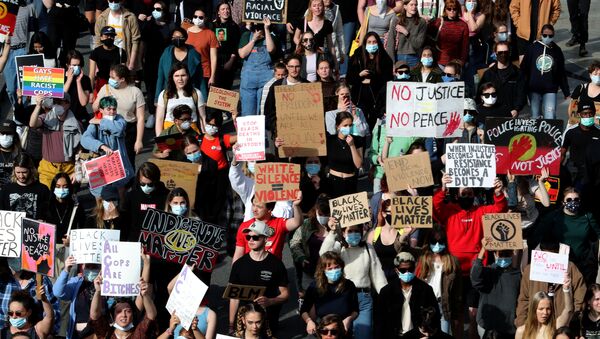Tempers have flared after Australia's national spy chief said he was "offended" by comparisons between a bill expanding his organisation's interrogation powers and a new security bill passed in China.
Mike Burgess, Australia's Security Intelligence Organisation (ASIO) head, hit back at the Law Council of Australia, who compared the two bills after it was found the legal age for compulsory interrogation would be lowered from 16 to 14 years old for suspects potentially involved in terrorism activities.
Further expansions would move investigatory powers from domestic terror threats to espionage, politically-motivated violence and foreign interference, the Sydney Morning Herald reported on Friday.
Mr Burgess' comments come after David Neal, Victorian barrister for the Law Council, said that compulsory questioning for those suspected of possible politically motivated violence may be larger in scope that China's National Security Bill.
But Australia's security chief said at a government inquiry on Friday that he was "actually offended by that statement".
"It's an offence to the men and women of my organisation ... some of them who put their lives on the line to protect Australians from serious security threats. To suggest that these bills are comparable or in fact our bill is worse, is just beyond the pale – it's completely, completely wrong," he said.
China's National Security Law made it a terrorism offence to damage public transport and subject protestors to life sentences in prison for having ties to foreign organisations, among others, he said.
"That is ridiculous, nothing like this amendment bill," he said.
He added that the ASIO was "prohibited" from getting involved in protests such as the ongoing Black Lives Matter movement, adding: "Protests are lawful in this country and we stay away from them. The only time we get involved is if there's acts of violence but protesters are fully supported."
When asked if the bill was broader in scope than China's security law by Mark Dreyfus, Opposition legal affairs spokesperson, Dr Neal yes, but added that compulsory questioning could last 40 hours and involve matters considered "detrimental to the interests of Australia because they've been talking to someone who's classified as a foreign power".
"Keeping in mind that it's not someone who is actually going to do something which is detrimental to it, but simply someone who may have information about that who could be subject to this compulsory questioning and a five-year penalty if they don't co-operate with that process," he added.
But Mr Burgess argued that Australia was facing unprecedented cases of spying and foreign interference, including escalating threats of violence from groups such as "neo-Nazis who are becoming more organised, committed and capable".
He added that Australians were radicalising at younger ages, citing returning fighters from Syria and Iraq as well as terrorists released from jail in several years.
"We are seeing increasing numbers of young Australians involved in onshore terrorism; this is being observed in both Islamic extremism and extreme right-wing circles, and this includes children as young as 13 and 14. I can confirm today we are currently investigating at ASIO counter-terrorism investigations which involve children as young as 14. This threat is amplified by the COVID crisis, with some young Australians being exposed to radicalisation as they've spent time online meeting and engaging with like-minded individuals," he explained.
The news comes after Mr Burgess said in November last year he would take "seriously" allegations that Beijing was planning to send spies into Australia and interfere with government in Hong Kong and Taiwan, citing Australian media.
The ASIO chief added at the time that he was "committed to protecting Australia’s democracy and sovereignty".
Australian prime minister Scott Morrison announced this week he would offer visa extensions and other aid to Hong Kong residents after China's national security bill enters force in August, sparking a diplomatic row with Beijing.
The moves follow measures from other Commonwealth nations such as the United Kingdom and Canada, who passed similar measures. But Chinese and Hong Kong officials have said that the new bill would only work to protect national security amid years of violent protests from groups allegedly linked to foreign organisations.



